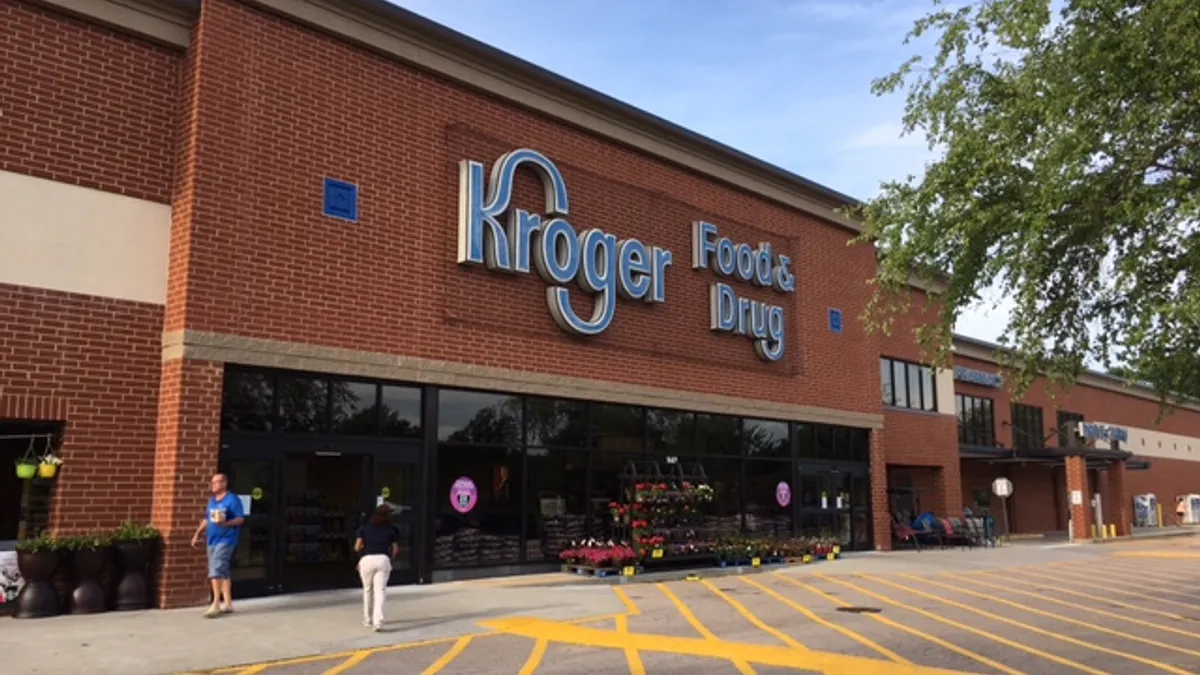Dive Brief:
- Kroger has announced a new "moonshot" effort to eliminate food waste across the company by 2025, according to a company statement. In doing this, the retailer also hopes to end hunger throughout the communities where it operates.
- The grocer outlined its "Zero Waste" 2020 goals in its annual sustainability report, which includes actions like 90% diversion from landfill in its facilities, increased use of reusable plastic containers, perishable foods donations and composting. Now, in partnership with both Feeding America and World Wildlife Fund, Kroger has also set the objective to eliminate food waste by 2025 through prevention, donation and diversion efforts in its stores.
- “Zero Hunger | Zero Waste is a vision for the America we want to help create with our associates, customers and stakeholders. This is our ‘moonshot,’ ” Chairman and CEO Rodney McMullen said in the company statement. “We recognize we have a lot of work to do. But we know when Kroger’s more than 443,000 associates put their passion to work to make something happen, we can uplift our communities, the planet and each other.”
Dive Insight:
An estimated 10% of the food that hits store shelves every year goes to waste, according to the U.S. Department of Agriculture, and roughly one-third of the food consumers buy and prepare goes uneaten. This waste harms the environment and hungry communities, and also takes a bite out of retailers' wallets. Businesses lose a collective $940 billion annually on food waste, according to Champions 12.3, a coalition of retailers, manufacturers, advocates and government entities.
In 2011, the Food Marketing Institute and the Grocery Manufacturers Association established the Food Waste Reduction Alliance, a coalition of manufacturers and retailers seeking to reduce food waste through recycling, charitable donations and other means. Leading U.S. supermarket Kroger has been on board, meeting or exceeding many of the goals it set out to achieve per its Zero Waste 2020 sustainability initiatives.
Now the grocer has an even more ambitious goal. In its statement, Kroger didn’t address how it plans to accomplish zero food waste, so specific initiatives remain to be seen — although many are likely to be extensions of its 2020 efforts. The grocer did indicate that it’s implementing a crowdsourcing initiative to solicit ideas, feedback and best practices from its communities, partners and other stakeholders. So more ideas should be forthcoming. Kroger undoubtedly will consider and share these suggestions, as retailer sustainability efforts are a good way to promote goodwill and positive public relations.
Kroger will likely be looking to its peers as well to gather ideas about their initiatives on what’s worked and what hasn’t. Leading U.K. grocer Tesco is addressing food waste by working with produce growers on more efficient harvesting methods. The grocer is also eliminating buy-one-get-one-free offers because they encourage too many consumers to buy more food than they can consume.
British supermarket chain Waitrose uses fuel made from food waste to power its eco-friendly delivery trucks. Whole Foods’ staff sorts food waste at the retailer’s stores. Last year Trader Joe’s donated $341 million worth of goods to food banks, and other supermarkets are implementing ugly produce programs to reduce fresh food waste.
Now that supermarket leader Kroger has gone public with its zero waste goals, it’s likely other grocers could try to follow suit. But tackling food waste is costly and time consuming. Just as different types of products require different handling methods to get to shelves, so do those that are removed and reused. And while harvesters, anaerobic digesters and other sustainable technologies are promising and effective, they’re too expensive for most retailers to adopt on more than a limited basis.








